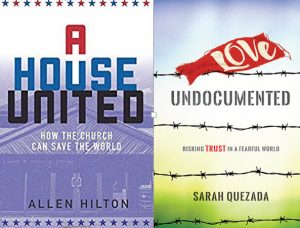 I was fortunate to read many books (published in 2018) worth recommending over the last month.
I was fortunate to read many books (published in 2018) worth recommending over the last month.
- (5.0) Love Undocumented: Risking Trust in a Fearful World by Sarah Quezada (Herald Press, 2018)
- (4.5) A House United: How the Church Can Save the World by Allen Hilton (Fortress Press, 2018)
- (4.0) Thriving in the Fire: Coaching Through the Conflicts of Change by Felix C. Villanueva (FirstStep Publishers, 2018)
- (4.0) Inspired: Slaying Giants, Walking on Water, and Loving the Bible Again by Rachel Held Evans (Thomas Nelson, 2018)
- (4.0) The Way of Jesus: Living a Spiritual and Ethical Life by Jay Parini (Beacon Press, 2018)
- (4.0) The Existentialist’s Survival Guide: How to Live Authentically in an Inauthentic Age by Gordon Marino (HarperOne, 2018)
- (4.0) In Search of Wisdom: A Monk, a Philosopher, and a Psychiatrist on What Matters Most by Matthieu Ricard, Christophe André, and Alexandre Jollien (Sounds True, 2018)
- (4.0) Gigged: The End of the Job and the Future of Work by Sarah Kessler (St. Martin’s Press, 2018)
- (4.0) The Third Door: The Wild Quest to Uncover How the World’s Most Successful People Launched Their Careers by Alex Banayan (Currency, 2018)
- (3.5) Soul Force: Seven Pivots toward Courage, Community, and Change by
So What?
For the second month in a row, the authors at the top of this month’s list are new to So What Faith.
Sarah Quezada’s Love Undocumented: Risking Trust in a Fearful World is the book I wish every American had read before the latest round of immigration issues surrounding the Supreme Court’s decision on President’s travel ban and the intentionally dehumanizing caging of children and separation of children from parents upon entry into our country. The book is Sarah’s story of learning about US immigration policy firsthand over many years while dating and later marrying a man who had to overcome numerous challenges.
Allen Hilton’s A House United: How the Church Can Save the World is a bold call for the church to take more seriously Jesus’ call that it would be one. At no time in recent history has America been more divided politically than it is today. While that polarization has been increasing so have other divisions, including income inequality. The church, however, is called to a position of humility that enables moving beyond functional and theological differences to be the church together. Rather than idealizing unity, Hilton calls individual Christians and Christian congregations to embody unity. Toward this end, he also shares a few unlikely stories of how congregations at opposite ends of the theological spectrum have partnered to make more real God’s realm on earth as it already is in heaven.
I invite you to reflect a bit on these two timely topics:
- Immigration. How is your congregation engaging this topic? Share an example of something you have found helpful.
- Unity. How often does your congregation partner with a faith community outside of your denomination or network? Share an example of a time that a joint effort led to more good than either group could have achieved on its own.
For additional recommendations of books published in 2018 check out